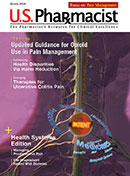Published June 29, 2016
Many Atrial Fibrillation Patients Improperly Treated With Aspirin Alone
San Diego—A substantial portion of atrial fibrillation patients (AF) at intermediate to high risk for stroke receive inappropriate therapy, according to a new study finding that nearly 40% of them are treated with aspirin alone.
Past research indicates that aspirin therapy alone is inferior to blood thinners, such as warfarin, for reduction of thromboembolism, according to the report published online by the Journal of the American College of Cardiology.
For the study, researchers from the University of California San Diego and San Francisco Schools of Medicine looked at more than 200,000 AF patients at risk for stroke, using the American College of Cardiology PINNACLE (Practice Innovation and Clinical Excellence) registry.
Background information in the article notes the incidence of stroke for AF patients is up to seven times greater than in those without the condition, largely because of an increased risk of blood clots when upper chambers of the heart are chaotic and the atrial walls quiver rather than contract normally in moving blood to the lower chambers.
“Stroke prevention is critical to the management of AF patients. However, giving aspirin alone to this population may not be the best treatment therapy because it is either minimally effective or not effective at all and still comes with risks, such as intracranial hemorrhage,” explained lead author Jonathan C. Hsu, MD, cardiologist at UC San Diego. “Our study results show a gap in the appropriate treatment of AF patients at risk for stroke. The findings also highlight the critical need for cardiology specialists to adhere to standardized recommendations regarding the use of oral blood thinners instead of aspirin.”
After multivariable adjustment, study results associated hypertension, dyslipidemia, coronary artery disease, prior myocardial infarction, unstable and stable angina, recent coronary artery bypass graft, and peripheral arterial disease with the prescription of aspirin only. On the other hand, male sex, higher body mass index, prior stroke/transient ischemic attack, prior systemic embolism, and congestive heart failure were associated with more frequent prescription of oral anticoagulants.
“The high rate of an aspirin-only prescription for AF patients with coronary artery disease and other stroke risk factors is concerning,” Hsu said in a UCSD press release. “It appears patients with more risk factors for having a stroke with AF are less likely to get the proper treatment, which is oral blood thinners.”
Another concern, according to study authors, is that about a third of AF patients in the study without significant coronary artery disease were prescribed both a blood thinner and aspirin, which heightened their bleeding risk with little or no benefit.
“The combination of drugs does not necessarily reduce cardiovascular events and stroke in an AF patient population and likely increases the risk of bleeding,” Hsu point out.
The study notes that concerns about uncontrolled bleeding likely lead to the underutilization of appropriate blood thinners in AF patients. It also suggests that some prescribers might believe that aspirin by itself is sufficient.
“Even the most knowledgeable physicians may find themselves in a bind when encountering a patient who needs antiplatelet drugs, such as aspirin, due to coronary disease and blood thinners for atrial fibrillation,” emphasized senior author Gregory Marcus, MD, of UC San Francisco School of Medicine. “While a large proportion of AF patients meeting the guidelines for stroke prevention medications fail to receive them, a lack of sufficient data regarding the clinical benefit among those with strong indications for both antiplatelet drugs and anticoagulants may in part be to blame.”
« ”Click here to return to Weekly News Update.





